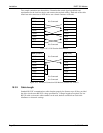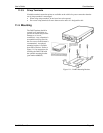
User’s Guide Device Attachment
2110212 Rev 1.0 Page 89
10.3. The Serial Connector
When testing the modem using a PC terminal, the cable is a standard RS-232 9-pin connection as
outlined below:
Pin Signal Direction
1 DCD – Data Carrier Detect DCE ! DTE
2 RxD – Receive Data DCE ! DTE
3 TxD – Transmit Data DCE " DTE
4 DTR – Data Terminal Ready DCE " DTE
5 GND – Signal Ground Common
6 DSR – Data Set Ready DCE ! DTE
7 RTS – Request to Send DCE " DTE
8 CTS – Clear to Send DCE ! DTE
9 RI – Ring Indicator DCE ! DTE
The pins are arranged in the connector as noted below:
12345
6789
Figure 10-1: Pinouts for Female DB-9 Connector (DCE).
10.3.1. Null-Modem Connection
When connecting the DART 300 to a local host device, there may be a need to use a “null-
modem” type of connection. The RS-232 interface specification was intended to standardize the
method that computers and terminals (DTE) used to communicate remotely over telephone lines
(DCE). The popularization of RS-232 serial communications resulted in many different types of
equipment, besides modems, that employ the DCE standard. Many manufacturers expect devices
to connect directly to DTE equipment (usually, PCs). Consequently, devices are designed with a
DCE interface, so a standard RS-232 cable meets the cabling requirements.
If the local device is designed for connection to a DTE terminal, it is already designed to be a DCE
device. Since the DART 300 is also a DCE device, the connections must be crossed over to
enable throughput. To identify this problem, connect a PC directly to the local host device and
establish communication. If communication is established, the device uses a DCE interface and
the null-modem cable will be required to connect to the DART 300 modem.
Null modem adapters are available that look like a RS-232 gender-changer. These adapters are
available from electronics stores and are well suited for application development. Null modem
cables can be ordered from cable suppliers and electronic stores. These are better suited for field
deployment because the cables eliminate the extra part and potential for failure that an adapter
would introduce.


















